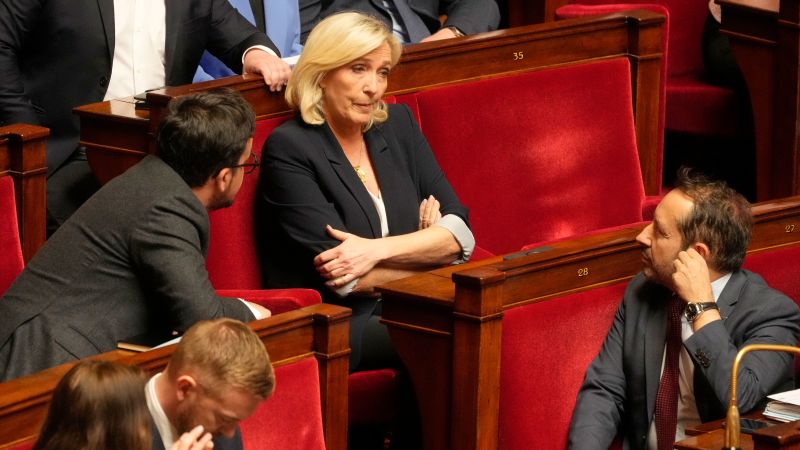This week, a French court found far-right figurehead Marine Le Pen guilty of embezzling millions of euros of European Union funds and banned her from running for political office for five years – knocking the frontrunner out of the 2027 presidential race and enraging her supporters. Coming so swiftly after Romania canceled the first-round election victory of a far-right candidate , Le Pen’s verdict has deepened a transatlantic debate about whether courts risk disenfranchising voters by removing a politician from electoral competition. Le Pen’s case is becoming a political Rorschach test.
Critics say the court’s decision is another instance of liberal elites weaponizing the judiciary to bar their political rivals from power. Supporters say the decision shows institutions working as designed, prosecuting any citizen who is guilty of a crime regardless of their political stripes and the potential backlash. For the first camp, “the will of the people” ought to be supreme.

For the second, adhering to the “rule of law” outweighs voters’ demands. The two cases have stoked fury among Europe’s right-wing nationalists, Donald Trump and many members of his administration, who feel the US president was subjected to similar acts of “lawfare” to try to stop him winning a second term. He is the first convicted felon to become president.
“The Witch Hunt against Marine Le Pen is another example of European Leftists using Lawfare to silence Free Speech, and censor their Political Opponent, this time going so far as to put that Opponent in prison,” Trump wrote Thursday on Truth Social. “When the radical left can’t win via a democratic vote, they abuse the legal system to jail their opponents,” Trump’s billionaire aide Elon Musk wrote on X after Monday’s verdict. “This is their standard playbook throughout the world.
” Vice President JD Vance has also singled out Romania as an instance of what he sees as democratic backsliding in Europe. Calin Georgescu unexpectedly won the first round of its presidential vote in November, but Romania’s constitutional court annulled the election after intelligence services suggested Russia had interfered to boost his TikTok campaign, which he and Moscow denied. The electoral bureau later banned Georgescu from May’s rerun, after prosecutors charged him with establishing a fascist group and other crimes.
In a blistering speech in February in Munich, Vance said the evidence against Georgescu was “flimsy” and chastised mainstream European leaders for “running in fear” of their voters. Although Vance’s intervention was broadly condemned in Europe – while Romania was praised for acting against alleged foreign interference – scholars of liberalism have warned that those attempting to defend democracy can end up digging its grave. “If we empower courts to cancel the outcome of elections because we’re shocked by who the winner is, we’re very close to living in a system of government whose ultimate arbiters are judges rather than people,” said political scientist Yascha Mounk, a professor at Johns Hopkins University.
Le Pen was convicted of embezzlement for using EU funds to pay her party’s political staff from 2004 to 2016, falsely claiming they were working as assistants to its members of the European Parliament. Her party, the National Rally (RN), was ordered to pay back the €4.1 million ($4.
4 million) the court said it had embezzled, as well as €2 million in fines. Le Pen has said she will appeal the court ruling. Without disputing the merits of the case, Mounk said such judicial decisions risk overreach.
“In a democracy, the way to beat extremists...
is at the ballot-box,” Mounk told CNN. If mainstream parties are unable to build durable coalitions, they cannot in the long-run resort to “a clever institutional end-run around the will of the people.” The great inversion Although this debate is deeply entrenched and goes back centuries, the two camps have recently switched sides.
Conservatives typically treasure civic institutions as a storehouse of ancestral wisdom; those on the left have championed universal rights, individual freedoms and the vox populi. But in recent years, those philosophical starting points have flipped, said Ben Ansell, professor of comparative democratic institutions at the University of Oxford. Left wing-progressives, once skeptical of the status quo, have become stolid guardians of institutions, while right-wing conservatives – once champions of prudence – are tearing down fences.
This reversal is particularly stark in the United States. Mike Lee, a Republican senator from Utah, spent years arguing that America is a republic, not a democracy, and that its system of checks and balances is more important than the will of the people. “Power is not found in mere majorities, but in carefully balanced power,” he wrote in 2020.
Now, perhaps swayed by Trump’s popular vote victory – the first for a Republican candidate in 20 years – many US conservatives appear to have changed their position, arguing the US is more a democracy than a republic. Trump pushed this argument to its extreme when he wrote on X in February, quoting Napoleon: “He who saves his Country does not violate any Law.” If an elected president is the will of the people incarnate, why should his prerogative be circumscribed by the courts? It is not clear how widely this belief is held in America, but Europe’s history may make its soil less fertile for such ideas.
In countries such as Germany, Spain, Italy – and on the other side of the Iron Curtain that split the continent for decades – many citizens have visceral memories of life under dictatorships and accept that their hard-won institutions are needed to prevent abuses of power. Nonetheless, a populist-peddled argument is taking root even here that these same institutions have been “captured” by liberal elites and are now themselves abusing their power. This perception could turn those who, like Le Pen and Georgescu, are penalized by those institutions, into martyrs, warned Mounk.
“In purely political terms, I think it is more likely to strengthen than to weaken” Le Pen’s RN party, he said. Le Pen’s hard-right European allies immediately rallied to her defense. “Je suis Marine,” said Hungary’s Prime Minister Viktor Orban, in a message of solidarity.
Matteo Salvini, Italy’s deputy prime minister, said that those who fear the voice of voters often take comfort in the judgment of the courts. The Kremlin, which leaps at chances to portray Western democracy as a sham, said the judgment showed Europe was “trampling on democratic norms.” ‘Two-tiered’ justice? Despite the noise and seeming groundswell of support, Mujtaba Rahman, managing director for Europe at political risk consultancy the Eurasia Group, said this is unlikely to be a vote-winner in France.
While the perceived political persecution of politicians like Le Pen will “motivate” the RN base, it is not clear if it would sway the swing voters needed to clinch an election, he said. The RN is also likely to suffer if Jordan Bardella , Le Pen’s inexperienced 29-year-old protégé, leads the party into the 2027 election, he said. “Any marginal benefit that the far right may gain from this broader conspiracy narrative will be offset by the fact that Bardella as a candidate is less effective,” Rahman told CNN.
And the conviction of Le Pen – who long railed against politicians getting caught with their “fingers in the till” before it happened to her – has precedent. Before France’s 2017 election, Francois Fillon – a mainstream conservative frontrunner – was found guilty of embezzling public funds to pay his wife and children for work they had not done. Although he was not banned from running, the verdict derailed his campaign.
Other French politicians – including on the left – have had their political ambitions dashed by legal travails. Ansell said European populists may be learning the wrong lessons from Trump’s victory. The president’s ability to win re-election – despite his hush-money conviction in New York and the mountain of other legal challenges he faced – might falsely suggest that he won because of the attempts to prosecute him, rather than despite them.
In a year when voters punished incumbents everywhere, Trump’s 2024 victory was more because he ran against an unpopular president who presided over an inflationary economy, Ansell said. An opinion poll conducted for CNN’s French affiliate, BFMTV, found 57% of those surveyed believe Le Pen’s conviction was a “normal judicial decision.” Being banned from running for political office “is bad for her – and it’s mad that that’s controversial,” Ansell told CNN.
While there is a risk of the courts being perceived as biased, there is also the danger of their overcorrecting, he said. If courts choose not to hear a case against a politician for fear of public backlash, despite prosecutors believing they have sufficient evidence of wrongdoing, institutionalists fear this would harm the rule of law. And although right-wing populists often claim they are the victims of a “two-tiered” justice system, this claim could go both ways if courts routinely decline to prosecute candidates to avoid stoking outrage.
Ansell warned against pandering to populists who would “play the victim” regardless of the merits of a case, casting doubt on the integrity of the institutions attempting to curtail wrongdoing. “There’s an odd double standard here,” he said. “The populists are supposed to get a kind of extra benefit that the other parties don’t get when their leaders get into trouble.
”.
Technology

Marine Le Pen verdict fuels debate that Europe’s ‘rule of law’ is throttling the ‘will of the people’
















